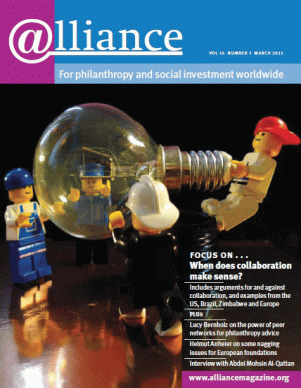It didn’t take long for me to get the message. I was discussing philanthropic trends at a recent event, and the suggestion that NGOs should be playing an active role at the heart of philanthropy advice was greeted with concern and even consternation.
The discussion raised some legitimate questions for me. What is the role of charities in supporting philanthropists and their advisers? Can charities provide good-quality philanthropy advice? Is advice compromised by the push to maximize income?
My conviction is that charities can play an important role – not just as passive recipients but also as active players – in supporting philanthropy advisers and, where appropriate, in directly advising their clients. Two years ago, Christian Aid established its own ‘tied advice’ service for wealth managers and advisers, where we can offer philanthropic advice related to Christian Aid’s areas of work. We saw this service as being comparable to tied advice in the financial services industry, where advisers offer advice about a company’s own range of products.
Our model begins with the client (ie the philanthropy adviser’s client) – understanding their objectives, motives and interests and exploring if there is a fit with our areas of work. We work with advisers to develop a philanthropy plan, taking into account the amount of money available, specific interests, and the amount of involvement the client wants. We outline the monitoring tools and how we assess impact. We then agree on how we provide feedback and involvement, from regular updates to project visits. One client sent their teenage daughter to spend time at our offices to see first-hand how NGOs work.
Christian Aid’s mandate is to end poverty, and private philanthropy has a huge role in achieving this goal. The DNA of today’s philanthropists means that they want engagement, and they want greater rigour used to see the difference they make. The recent Barclays Wealth white paper, in cooperation with Ledbury Research, shows that almost a quarter of high net worth individuals surveyed globally say charity is a top priority. This is good news. Advisers can play a crucial role in turning good intentions into action. If advisers are in open dialogue with effective charities, discussing developments in the sector, it stands to reason that they can have more credible and informed conversations with their clients.
What gives an NGO the credibility to provide advice? Well, in the case of Christian Aid, we have 60 years’ worth of aggregated learning on poverty eradication in the developing world. As a ‘top five’ development charity, we have developed mechanisms to track and evaluate social impact. (In a recent Global Accountability Report, Christian Aid was ranked first among the ten NGOs assessed.) We also already have experience of helping philanthropists understand their motives and make good giving decisions. We can, and have, drawn on their experiences to help those new to philanthropy. We see all this experience as valuable for advisers.
We do not claim to be independent. Independent advice has an important role to play. However, above independence, what philanthropists really need from their advice is integrity. All advice will come with cultural and values bias – the key is being explicit about where that bias is located. We don’t feel philanthropy advice should become an exclusive domain of certain sectors or organizations. That would be a disservice to clients.
Olga Alexeeva articulated the two ingredients vital for successful philanthropy advice in the September 2010 issue of Alliance: knowledge of givers and knowledge of how to deploy capital for a social purpose – the latter being very much the realm of an NGO like Christian Aid. It therefore seems clear that advisers and charities need each other. On our part, we need to be prepared to put philanthropists’ interest above that of an individual organization. If there isn’t a fit, charities must make this clear and suggest alternatives.
Christian Aid’s progress so far in this area has been positive. We are seeing advisers seeking our support. They are asking us how they can help their clients frame their philanthropy, as well as coming up with some specific queries on our specialist area of international development. Those conversations are happening because advisers value the perspective we bring.
In the long term, we are committed to playing an active role in improving the quality and quantity of philanthropy advice to wealthy individuals. So, as time goes by, rather than evoking concern and consternation, my hope is that the involvement of NGOs will be seen as crucial to the area of philanthropy advice.
Sujit Peris is new philanthropy manager at Christian Aid. Email SPeris@christian-aid.org


Comments (0)